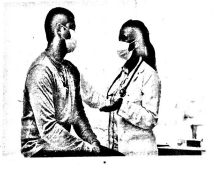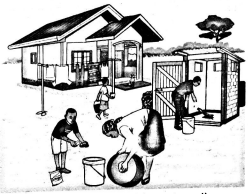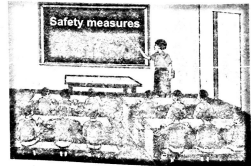Read the conversation below and then answer questions 1-6.
Doctor: Good morning!
Patient: Is it really a good morning, Doctor?
Doctor: Oh, I should have known better. Sorry! How may I be
of help to you?
Patient: I need to know what is wrong with me. I have been feeling unwell lately.
Doctor: Sorry to hear that. How exactly are you feeling? Patient: I feel weak and fatigued. I have lost appetite as well.
Doctor: Anything else?
Patient: I seem to have a fever too especially at night.
Doctor: How long have you been feeling this way?
Patient: For over a month now.
Doctor: A month! What took you so long to seek medical help?
Patient: First, I bought some drugs over the counter. Besides, I have been busy with farm work. You know we are in the planting season right.
Doctor: (Shaking his head) Oh, God! The first step you took was wrong. It is not
recommendable to buy drugs without the doctor's prescription. The second one is a flimsy excuse to give for neglecting your health.
Patient: I understand, Doctor.
Doctor: Health is wealth. If you are not healthy, you cannot even go to work to create wealth. Next time you had better take action immediately and seek medical attention.
Patient: I am sorry, Doctor. I promise to abide by your advice.
- The doctor begins the talk by greeting the patient. What does that show?
- What do we learn about buying drugs over the counter?
- Give two reasons why the patient did not seek medical attention.
- The doctor shook his head to express
- Write words that are similar in meaning to the following
- Flimsy
- Fatigued
- Weak
- Mention one more proverb with the words healthy, wealthy and wise.
Read the following passage and then answer questions 7-12.
Every morning, Maureen wakes up very early to attend to her family obligations. She prepares her family's favourite breakfast before waking her siblings up. Her little brothers, Tuzo and Zawadi are twins and they are always up to mischief. At the age of three, they have already learnt a few tricks which they often play on Maureen, especially when they do not want to wake up in the morning. They pretend to be asleep and no matter how many times she calls them, they will neither answer nor budge until she carries them to the living room. She then sings their favourite song. Only then will they take their breakfast, but not without arguing who should use the twin's favourite cup.
Martin the second born, who is ten years old, is very amiable and easy to deal with. He is obedient as he is always ready to listen and learn from his elder sister from whom he draws a lot of inspiration. At school, he is adored by teachers and learners in equal measure because of his humble, reliable and peaceful nature, not to mention his neatness. He is also very committed to his studies.
After school, the children help their mother with household chores like washing utensils, preparing meals and bathing the little twin brothers. By the time their mother gets back from the dispensary where she works as a nurse, the house is in order, thanks to the able and responsible Maureen and her helpful brother, Martin. Mother does the bit that the children are not able to manage and gives them time to do their homework before taking supper.
Their father only comes home over the weekend since he works in a town far away from home. His coming is usually eagerly awaited because he comes with lots of goods for every member of the family. The weekend ends with an outing to a recreational facility where each member does what they love most.
- How many members are there in Maureen' family?
- Explain the meaning of the following words as used in the passage:
- Thanks to
- Recreation
- Chore
- In what ways do the children help their mother after school?
- Use three adjectives to describe Maureen.
- How does Maureen's father appreciate his family members?
- The best title for the passage above would be
Read the passage below and then answer questions 13-18.
Introduction
Safety is the state in which a person or place is not in danger or at risk. It is important to keep safe in the classroom so as to have a conducive learning environment.
Safety measures
To be safe in the classroom, you should adhere to the following measures:
- Wash your hands regularly and use toilets or latrines appropriately to avoid contracting diseases.
- Keep your classroom clean by sweeping, collecting litter and washing or sprinkling water on the floor. Ensure you dispose of the litter in the right place such as in a rubbish pit or dustbin.
- Arrange the desks and chairs in your classroom neatly to avoid people tripping and falling as they walk around. Also, avoid playing in the classroom as it can lead to injuries.
- Avoid leaving sharp objects such as dividers and compasses found in mathematical sets and razor blades lying around. These can prick or cut someone.
- Avoid leaving spilt water or other liquids on the floor as people could slip and fall. Always wipe any spillage immediately.
- Chemicals in the laboratory and tools like hoes or machetes should always be handled carefully and put away in a locked place after use.
Observing the above safety measures will help you enjoy learning without worrying about injuries.
- Why is it important to keep safe in the classroom?
- What do we learn about those people who rarely wash hands?
- What happens when you leave sharp objects lying around?
- Write one proverb with the word slip.
- Explain the meaning of
- Dispose of
- Neatly
- Make short notes on the measures to take so as to be safe in the classroom.
- Wash hands regularly.
Read the passage below and then answer questions 19-24
My name is Wanja. I really enjoy helping in our family kiosk after school and over the weekends. The kiosk can get as busy as a beehive: My mother stocks the kiosk every week so we always have the products our customers need. She buys the products from a wholesale shop, which we then sell at retail prices. This gives us a profit on most sales.
I keep records of every item I sell. Sometimes I feel nervous about handling so much cash. In the evening, I hand over a report to my mother. I always hope that my records are correct. Last week was no exception. Mother opened the kiosk then left me to do business.
"Wanja, may I please have a packet of milk, a loaf of bread and three eggs?" asked Ndalu. He is a frequent customer who lives in the neighbourhood. "Yes, of course. Do you have a bag for carrying these items or do you want a new one?
"It seems I always forget to bring one. I have so many at home. I forget that a shilling saved is a shilling earned. Give me a new one, please."
"One bag costs twenty shillings."
"That is okay. I have no choice."
"That will be one hundred and sixty shillings altogether," I told Ndalu.
"Here is a two-hundred- shilling note."
"Thanks. Here are your items and your change of forty shillings. Thank you for shopping with us." I recorded the sale in the book I use for recording transactions.
The next customer was an elderly man. "May I have a packet of milk and a loaf of bread please?" he asked. "Here is some money. I do not even know how much it is."
"I am sorry sir, you are short by twenty shillings," I told him after counting the coins. "I shall bring you the twenty shillings next week. Please give me the milk and the bread. I am hungry."
- When does Wanja help in the family kiosk?
- Why do you think Wanja's mother stocks the kiosk every week?
- If you sell a product, you can either get a _______________ or incur a ________________
- Why should every trader keep a record of the money that comes in and spend?
- Complete the phrase correctly: A shilling saved is a ______________________
- What lesson do we learn from the passage above?
Read the passage below. It contains blank spaces numbered 25-29. For each blank space, choose the best word from the ones given in the brackets.
The government of Kenya__25__several steps to stop child labour. One of the steps __26__to pay part of the cost of educational materials and school fees. The government also __27__ free textbooks to all learners to ensure that all children attend school __28__, the government has an emergency, toll-free hotline where cases of child labour__29__ be reported.
(can, produces, has taken, may, provides, have taken, therefore, in addition, are, is,)
Form abstract nouns from the words in brackets and then use them to answer questions 30-34,
We took part in the contest and won. Our (happy)__30__ could not be measured. The (beautiful) __31__ of it all was that no one expected us to win. We were underdogs. The thought of that is a source of great (joyful)__32__. The key to our (success)__33__was hard work. We had (faithful)__34__in our coach and took his advice seriously. No wonder we emerged victors.
For questions 35-39, rewrite the sentence changing the underlined verbs into the tense given in brackets.
- I buy a new handkerchief on my way home. (past tense)
- Paul sends an email to his aunt in Kitui. (future tense)
- I collect rubbish around our home on Saturday. (past tense)
- Anne read the poem titled 'Good Hygiene Practices' to the class. (future tense)
- Antony shaves his hair to keep it neat. (past tense)
For questions 40-44, fill in the blank spaces with the correct alternative from the words in the brackets.
- Now that we have cleared all the dirt, _________________________eise can we do? (where/what)
- Our parents know what is best for us so we ___________________________ obey them. (should/will)
- My class manager talked to my father _________________________phone. (on/with)
- The benefits of exercising are ____________________ (a lot/many)
- We could either call __________________ SMS him. (nor/or)
For questions 45-48 write the word that means the opposite of the underlined word. 45.
- The movie we watched was very boring.
- The polite boy was rewarded by the head teacher.
- The driver had to stop at the zebra crossing to allow the pedestrians to cross.
- We bought fresh fruits and ate them after taking our lunch.
For questions 49 and 50, write the meaning of the underlined word(s).
- It is neither polite nor acceptable to hang. the phone on somebody.
- Mwangi is a giraffe.
MARKING SCHEME
- It shows that he is pollte.
- Buying drugs over the counter can be harmful; you may not know the disease you are treating.
-
- He thought he would feel better after buying drugs over the counter.
- He was busy on farm being a planting season.
- shock
-
- Flimsy-not convincing enough
- Fatigued-tired out/worn out
- Weak-feeble
- Early to bed and early to rise makes a man healthy, wealthy and wise.
- Six
-
- because of
- the act of going out to enjoy yourself during your free time
- a duty
-
- washing utensils
- Preparing meals
- Bathing the little twin brothers
-
- Hardworking
- Caring
- Dependable/reliable
- He buys them presents and takes them out.
- The responsible Maureen.
- In order to have a conducive learning environment.
- They are likely to contract waterborne diseases.
- They can prick or cut somebody.
- A slip is not a fall.
-
- Dispose of-to get rid of, do away with or discard.
- Tidily
- 2. Keep the classroom clean.
3. Arrange desks and chairs neatly.
4. Avold leaving sharp objects lying anyhow.
5. Avoid leaving split water.
6. Handle chemicals carefully in the laboratory. - Everyday after school and over the weekend.
- For the customers to get the products they need.
- profit, loss
- In order to tell whether the business is making profit or loss.
- a shilling eamed.
- Children need to be responsible at home.
- has taken
- is
- provides
- In addition
- can
- happiness
- beauty
- joy
- success
- faith
- I bought a new handkerchief on my way home.
- Paul will send an email to his aunt in Kitul.
- I collected rubbish around our home on Saturday.
- Anne will read the poem titled 'Good Hygiene Practices' to the class.
- Antony shaved his hair to keep it neat.
- what
- should
- on
- many
- or
- Interesting
- rude
- start
- stale
- It is not polite and neither acceptable to hang the phone on somebody.
- Mwangi is very tall.
Download English Questions and Answers - Grade 7 End Term 1 Exams 2023 Set 1.
Tap Here to Download for 30/-
Get on WhatsApp for 30/-
Why download?
- ✔ To read offline at any time.
- ✔ To Print at your convenience
- ✔ Share Easily with Friends / Students




